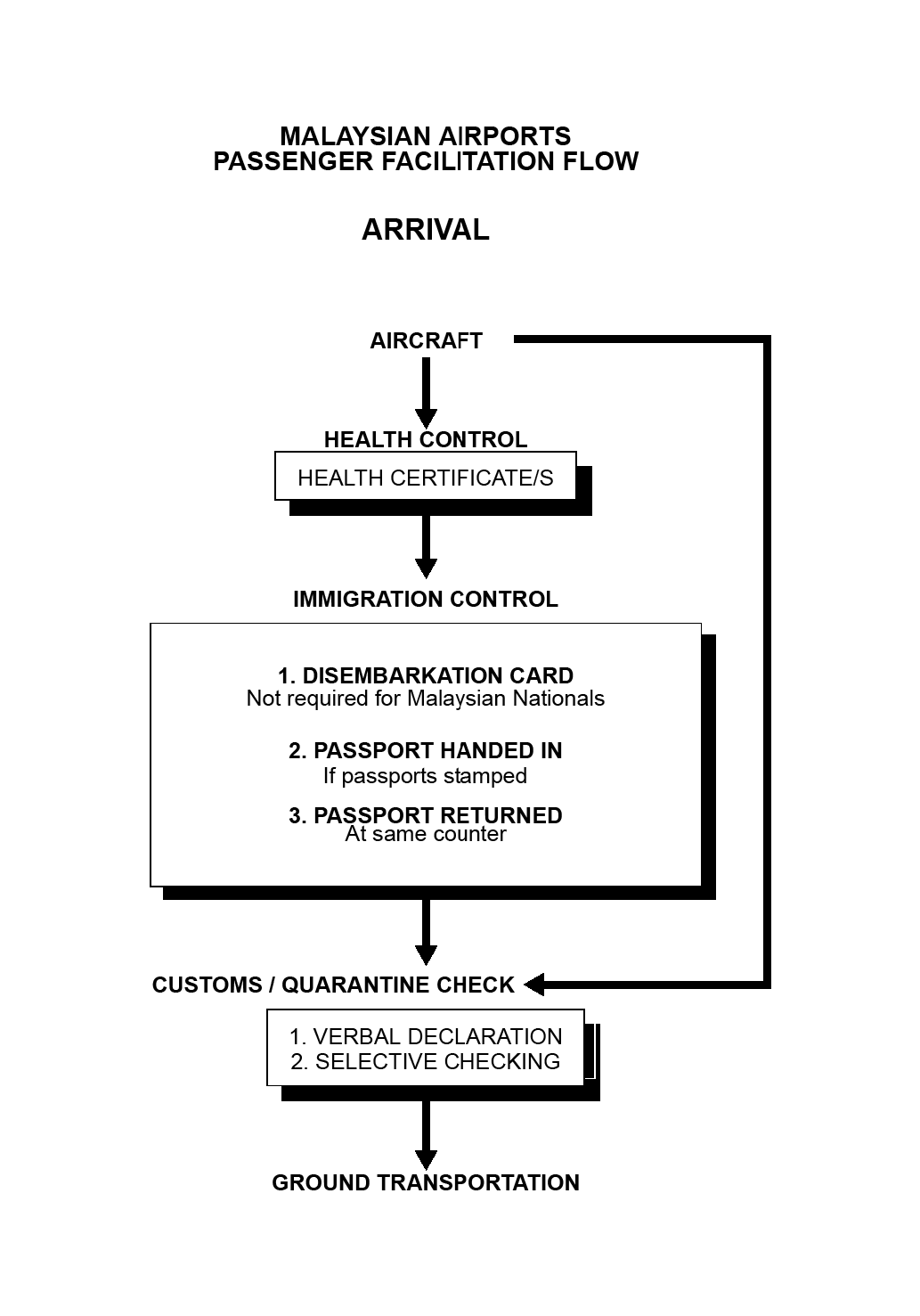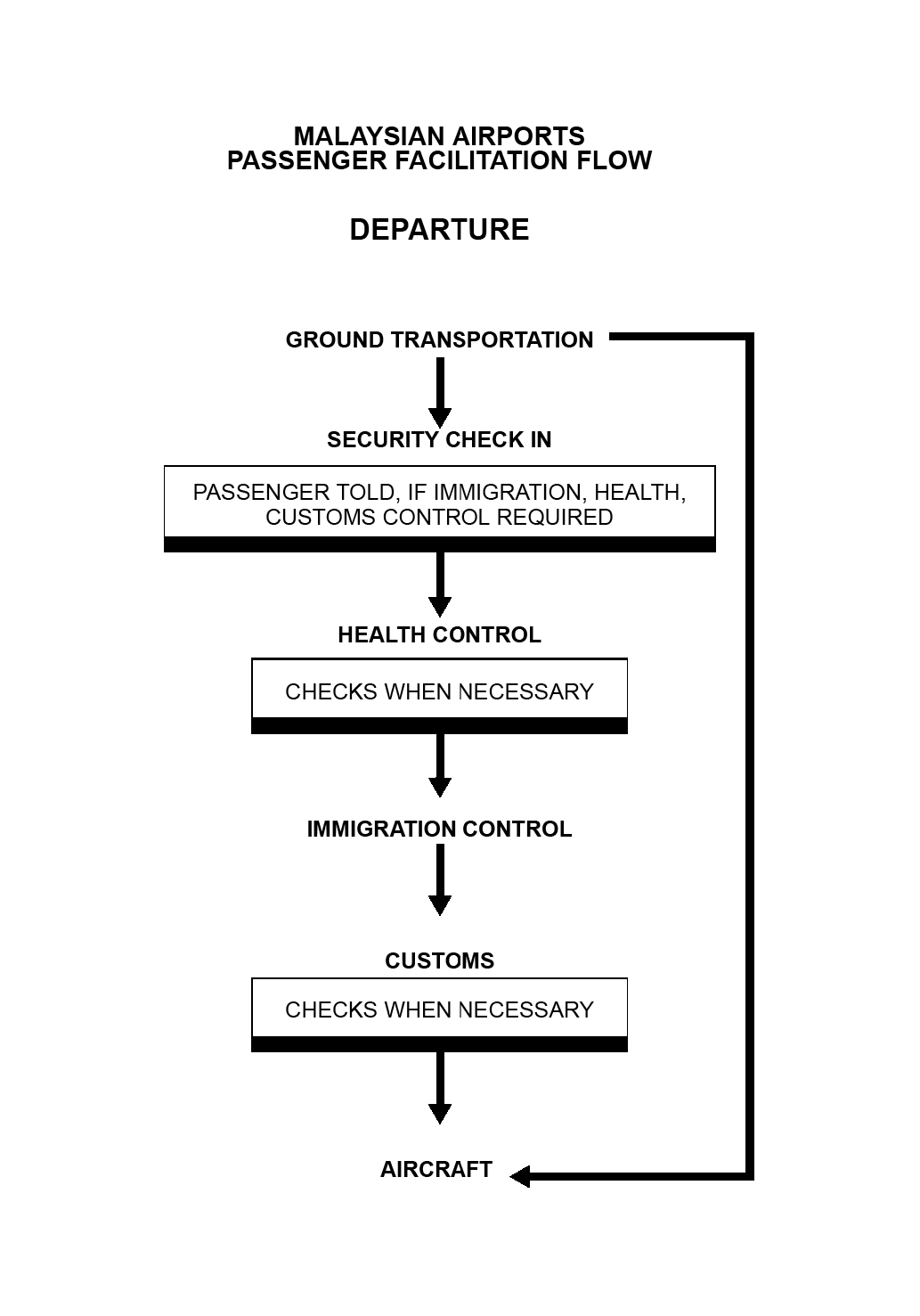GEN 1.3 ENTRY, TRANSIT AND DEPARTURE OF PASSENGER AND CREW
PENINSULAR MALAYSIA
1.3.1 CUSTOMS REQUIREMENTS
Talcum powder and face powder.
Products for the care of hair (e.g. hair cream, shampoo, hair dyes).
Sound recorders and reproducers including record players and tape decks.
Radio broadcast receivers including those incorporating sound recorders or reproducers for motor.
Radio broadcast receivers whether or not incorporating sound recorders and reproducers.
Ball point pens of artificial plastic material.
Carpets other than those made of jute.
Textile articles.
Typewriters.
Glassware.
Telephones.
Electric smoothing irons.
Video cassette recorders.
Slide projectors.
Electric lamps and light fittings.
Food grinders and mixers.
Rice cooker.
Electric kettles.
Gramophone records.
Razors and razor blades.
Kitchen knives.
Locks and padlocks.
Lamp shades.
Handbags.
Playing cards.
Fruits (fresh and preserved).
Chocolates.
Ginseng.
Calendars.
Car accessories.
Footwear.
Golf balls.
Fountain pens.
Cigarette lighters (except of plastic).
Printed books, newspapers and journals.
Perfumeries.
Cosmetics (except face powder) and skincare products e.g. lipsticks, eye shadows, moisturisers, skin tonics.
Manicure preparations e.g. nail polishers and varnishers, varnish removers.
Portable radios incorporating sound recorder or reproducers (weighing less than 10 kg, with handles/straps and
AC/DC powered.
Pocket watches, wrist watches and clocks.
Carpets made of jute.
Photographic cameras, photographic flashbulbs, photographic flashlight apparatus and films in rolls.
Video tapes (blank or recorded)
Cinematography cameras, projectors, sound recorder and sound reproducers, for films of less than 16 mm width including cameras for double 8 mm film.
Video cameras and television cameras.
Calculators
Gold coins
Computers
Fishing equipment (eg. fishing rods, hooks etc)
Golf clubs (complete)
Racquets eg. tennis, badminton etc.
Used personal effects
That the visitor satisfies the Customs Officer that he is not normally resident in Malaysia and intends to visit Malaysia for a period of not less than 72 hours. In the case of Malaysians, that the person had left the country for a period of not less than 72 hours. (For Federal Territory of Labuan, the period is 24 hours and Langkawi, the period is 48 hours).
The allowances are:
Wine, spirits or malt liqour not exceeding 1 litre in all.
Tobacco not exceeding 225 grams (equivalent to 200 cigarettes)
Matches not exceeding 100 sticks.
Cosmetics, soaps and dentifrices, in open containers to a total value not exceeding RM200.
New wearing apparels not exceeding 3 pieces.
New footwear not exceeding one pair.
Portable electrically and battery operated appliances for personal care and hygiene not exceeding 1 unit each.
Dutiable food preparations to a total value not exceeding RM75.
Gifts and souvenirs to a total value not exceeding RM200 (except goods from Langkawi and Labuan, total value not exceeding RM500)
Portable goods and equipment for private use.
That the vehicle has been registered by the authority responsible for registering or licensing such motor vehicles.
That in the case of a vehicle registered in a foreign country, it shall be exported within three months from the date from import.
Any other conditions the Director General of Customs may deem fit to impose.
Any article bearing the imprint or reproduction of any currency note, bank note, or coin which are current or have at any time been issued or current in any country.
Any emblem or device in circumstances which raise a reasonable presumption that such emblem or devise was intended or was likely to be used in a manner prejudicial to the interest of the Federation or to promote or foster a purpose prejudicial to or incompatible with peace, welfare or good order in the Federation.
Cocoa pods, rambutans, pulasan, longan, and nam-nam fruits from the Philippines and Indonesia.
Indecent or obscene prints, paintings, photographs, books, cards, lithographic or other engravings, films, video tapes, laser discs, colour slides, computer diskettes and any other media (including unprocessed films) or any other indecent or obscene articles.
All goods from Haiti.
All genus of Piranha fish.
Turtle eggs.
Daggers and flick knives.
Sodium arsenite.
Intoxicating liquors containing any lead or compound of lead of more than 3.46 milligrams per litre, whether in the form of copper or any compound of copper.
Broadcast receivers capable of receiving radio communication within the ranges (68-87) MHz and (108- 174) MHz except those designed to receive meteorological broadcasts at spot frequencies (except those for the use of the telecommunication authorities).
Pens, pencils and other articles resembling syringes.
Poisonous chemicals i.e. crocidolite, Polybrominated Biphenyls, Poly-chlorinated Biphenyls, Polychlorinated Terphenyls and Tris (2,3 - dibromopropyl) Phosphate.
Cloth bearing the imprint or reproduction of any verses of the Quran.
All multicolour copying machines including Rank Xerox 6500, Canon NP Colour T and Ricoh Colour 500.
Any animal or bird, other than a domestic animal or domestic fowl, whether alive or dead or any part thereof including all animals and birds specified in any written law in Federation.
Meat extracts and meat juices.
Domestic animal, alive or dead or any part thereof, including edible meat offals.
Video machines, excluding game watches and video games for use with television receivers.
Rice and padi including rice flour, rice polishing, rice bran and rice vermicelli.
Radio communications apparatus capable of being used for telecommunication in the frequency band lower than 3000 GHz.
Fireworks (including fire crackers).
Imitation arms including toy guns and toy pistols.
Imitation hand grenades.
Arms and ammunition as defined under the Arms Act 1960, other than personal arms and ammunition imported by bonafide travellers.
Bullet-proof vests, steel helmets and other articles of clothing as protection against attack.
Pests including any vertebrate or invertebrate animal.
Soil including earth, ground or other natural occuring organic and mineral in which plants may be grown.
Sugars.
Safety helmets (except as worn by motor-cyclist or motorcycle pillion riders).
Apparatus or equipment to be attached to or connected to a Public Telecommunication network or system.
Household and agricultural pesticides.
Electrical apparatus for domestic use operating at 50 volts or 120 volts DC and above such as Hi Fi sets, electric smoothing irons, food mixers, hair dryers, rice cookers, television sets, electric kettles etc.
Motor vehicles.
Cabbages (round).
Batik sarong.
Saccharin and its salts.
Eggs in the shell.
Poultry.
Explosives.
Live fish.
Parabolic antennae for outdoor use.
Pests and organisms which are capable of being injurious to plants.
Milk and milk products.
Animal oils and fats.
Plants including any species of plant or any part thereof whether live or dead.
Toxic and/or hazardous wastes.
Corals, alive or dead.
Apparatus/equipment for the brewing of beer in the home.
The above list is not exhaustive. Kindly consult the Customs Officer on duty if you have any enquiries. Import licences may be obtained from the authorities as stated under the headings Customs (Prohibition of Imports) Order 1998 and Customs (Prohibition of Exports) Order 1998.
Film Censorship Unit,
Ministry of Home Affairs,
Section ‘C’, 12th. Floor, AMDB Building, No.1 Damai Complex,
Jalan Lumut,
50400 Kuala Lumpur, Malaysia.
Tel: (+60) 3 4436122
Fax: (+60) 3 4437564
National Film Development Corporation (FINAS),
Merdeka Studio, Lot 1662,
Batu 6, Hulu Kelang,
68000 Ampang,
Selangor, Malaysia.
Tel: (+60) 3 4085722
Fax: (+60) 3 4075216
Turtle eggs.
Rattan from Peninsular Malaysia.
Any animal or bird, other than a domestic animal or domestic fowl, whether dead or alive or any part thereof, including all animals and birds specified in any written law in Malaysia.
Collections and collectors pieces of zoological, botanical, mineralogical, anatomical, historical, archaeological, ethnographic or numismatic interest.
Poultry.
Sugars.
Cockles.
Live prawns/shrimps/fish.
Skins and other parts of birds.
Domestic animal, alive or dead, or any part thereof, including edible meat offals.
Any species of plant or any part thereof.
Vegetables, fresh, chilled or frozen in excess of 3 kilograms per consignment.
All oil palm living tissues.
Military clothing and equipment.
Arms and ammunition.
Antiquities as defined or stated in any written law in Malaysia.
Meat extracts and meat juices.
All goods to Israel.
Corals alive or dead.
Eggs.
Rice and padi.
Toxic and hazardous wastes.
The above list again is not exhaustive. Kindly check with the Customs Officer on duty should you have any doubts.
1.3.2 IMMIGRATION REQUIREMENTS
Members of any visiting forces within the meaning of any law for the time being in force regulating visiting forces present in the Federation;
Bonafide Muslim pilgrims permanently resident in Malaysia, Singapore and Brunei returning from Saudi Arabia.
Citizens from Commonwealth countries or British protectorate or citizens of the Republic of Ireland; (except Bangladesh, India, Pakistan and Sri Lanka).
Those persons exempted under para 1.3. 2.2 above;
Nationals of Liechtenstein, Netherlands, San Marino and Switzerland;
Nationals of Albania, Argentina, Austria, Belgium, Bosnia-Herzegovina, Czech Republic, Slovakia, Denmark, France, Finland, Germany, Hungary, Iceland, Italy, Japan, Kyrgyzstan, Luxembourg, Norway, Peru, South Korea, Sweden, Tunisia, Turkmenistan and Spain entering in transit or for a temporary stay not exceeding three months other than for employment;
Citizens of the United States of America arriving for a temporary stay or for any purpose other than employment.
Citizens of Asian countries from Indonesia, Philippines and Thailand (except Singapore and Brunei) for stay not exceeding one (1) month for social and business purpose;
Citizens of West Asia countries from Algeria, Bahrain, United Arab Emirates, Jordan, Kuwait, Lebanon, Egypt, Morocco, Oman, Qatar, Saudi Arabia, Turkey and Yemen entering in transit, visiting not exceeding three (3) months while citizen from Afghanistan, Iran, Libya and Syria for a period not exceeding fourteen (14) days;
Citizens from Bulgaria, Romania, Latvia, Lithuania, Estonia, Georgia, Russia, Belarus, Ukraine, Uzbekistan, Kazakhstan, Kyrgyzstan, Tajikistan, Azerbaijan and Moldovia entering for short visit not exceeding seven (7) days;
Citizens not classified in the countries stated above (except Bangladesh, Bhutan, Cuba, India, North Korea, Myanmar, Nepal, Pakistan, Peoples Republic of China, Sri Lanka, Taiwan and Vietnam) entering in transit, social visit for a stay not exceeding one (1) month;
Passengers in transit to the third country entering Malaysia for duration of not more than 72 hours entering and leaving through same Airport (point of entry);
Note: Airline companies, in their own interests, should not book passengers unless they are in possession of the necessary documents as they will be held responsible for the maintenance and removal from Peninsular Malaysia of any person refused permission to land.
1.3.3 PUBLIC HEALTH REQUIREMENTS
A period of 10 years, beginning ten days after the date of vaccination, or in the event of a revaccination within such period of ten years, from the date of that revaccination.
1.3.4 PLANT QUARANTINE REQUIREMENTS
Note: The Airline Crew is to notify or hand over all agricultural items left by passengers on board the plane to the Plant Quarantine Authority for the purpose of destruction.
1.3.5 Currency Control Requirements
a traveller to export or import ringgit notes, or to export foreign currency exceeding the permitted limits; and
any person other than a traveller to export or import foreign currency or ringgit notes irrespective of amount.
SABAH / SARAWAK (EAST MALAYSIA)
1.3.6 CUSTOMS REQUIREMENTS
1.3.7 IMMIGRATION REQUIREMENTS
1.3.8 PUBLIC HEALTH REQUIREMENTS

